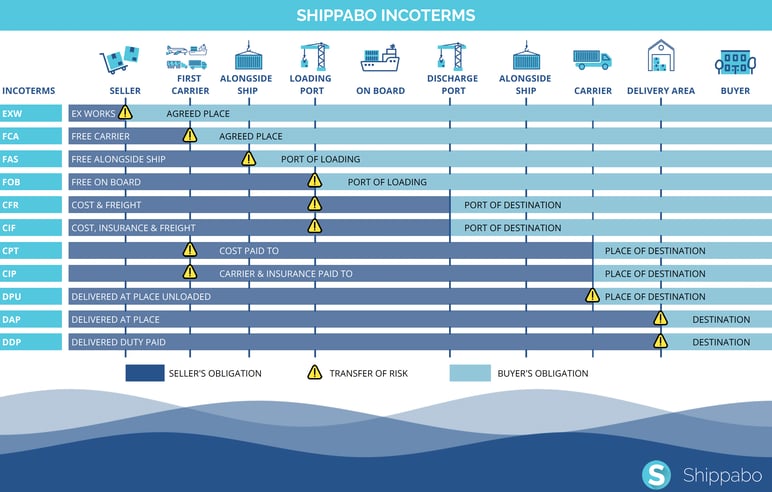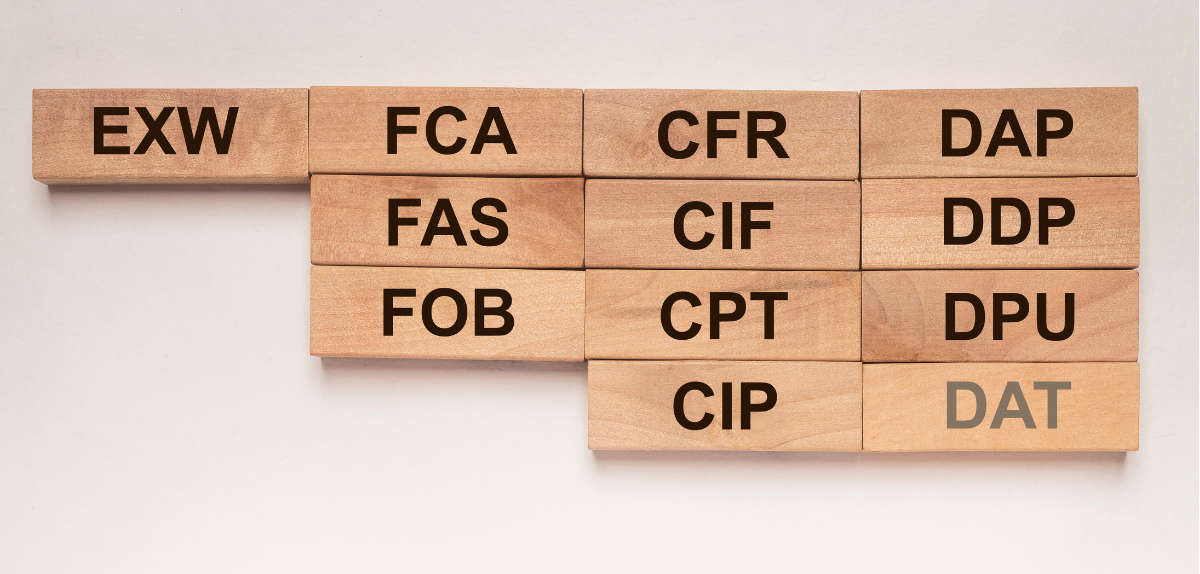What are Incoterms®?
Navigating different countries and their customs regulations can be a daunting task. That's why Incoterms® exist – to make global trade easier, clearer and more efficient for importing or exporting goods between countries. At Shippabo, we strive to provide you with transparency when it comes to keeping track of the costs associated with transporting your products from point A to Z; so you never get blindsided by surprise fees.
Although most Incoterms® rules are applicable here at Shippabo, there may be exceptions depending on each shipment – so don’t hesitate to reach out if you would like more information about our services.
Incoterms® are globally-recognized agreements that define the responsibilities of buyers and sellers during international shipping. As a trademark of the International Chamber of Commerce, they offer businesses assurance when it comes to buying or selling across borders.
The International Chamber of Commerce is keeping international commerce up-to-date with their Incoterms® rules. The most current version was released in 2020, and this remains effective today in 2023.
Incoterms® and Their Definitions
Here’s the list we pulled from trade.gov:
Seven Incoterms® 2020 rules for any mode(s) of transport:
-
EXW - Ex Works (insert place of delivery)
-
FCA - Free Carrier (Insert named place of delivery)
-
CPT - Carriage Paid to (insert place of destination)
-
CIP - Carriage and Insurance Paid To (insert place of destination)
-
DAP - Delivered at Place (insert named place of destination)
-
DPU - Delivered at Place Unloaded (insert of place of destination)
-
DDP - Delivered Duty Paid (Insert place of destination)
Note: the DPU Incoterms replaces the old DAT, with additional requirements for the seller to unload the goods from the arriving means of transport.
Four Incoterms® 2020 rules for Sea and Inland Waterway Transport are:
- FAS - Free Alongside Ship (insert name of port of loading)
- FOB - Free on Board (insert named port of loading)
- CFR - Cost and Freight (insert named port of destination)
- CIF - Cost Insurance and Freight (insert named port of destination)
Visit trade.gov for more details.
Incoterms® Explained
EXW (Ex Works) - This type of term indicates that the seller is responsible for making the goods available at their premises, and the buyer is responsible for collecting them from there. The seller does not have to bear any costs or risks associated with transporting the goods, as this is all the responsibility of the buyer.
FCA (Free Carrier) - This type of term indicates that the seller is responsible for delivering the goods, cleared for export and packaged, to a named location. The buyer has the responsibility of arranging and paying for carriage and insurance from this point onwards.
CPT (Carriage Paid To) - This is used when the seller agrees to pay for all costs associated with the transport of goods up to a specified destination. The risk and costs associated with any further transport from that point onwards is then passed onto the buyer. This type of Incoterm is most often used in cases where the goods are delivered directly to the buyer's door.
CIP - (Carriage and Insurance Paid To) This requires the seller to pay for all costs associated with the transport of goods up to a specified destination, as well as for any associated insurance costs. The risk and responsibility for any further transport from that point onwards is then passed onto the buyer. This type of Incoterm is most often used when goods are shipped by air or sea.
DAP (Delivered At Place)- This indicates that the seller is responsible for delivering the goods at a named place, cleared for importation, but not unloaded from any form of transport. The buyer then takes on responsibility for unloading costs from this point onwards.
DPU (Delivered at Place) - This requires the seller to deliver goods to a specified destination, but does not require them to assume responsibility for any additional costs such as customs duties or taxes. The buyer then assumes the risk and responsibility for unloading the goods at their end.
DDP (Delivered Duty Paid) - This requires the seller to be responsible for all costs associated with delivering goods to a named destination, including any customs duties or taxes. The buyer is then responsible for unloading the goods at their end.
FAS (Free Alongside Ship) - In this term, the seller must deliver the goods alongside a named vessel at the port of shipment. The buyer is responsible for loading, carriage and insurance costs from this point onwards.
FOB (Free On Board) - In this term, the seller must deliver the goods on board a named vessel at the port of shipment. The buyer then takes over responsibility for loading, carriage and insurance costs from this point onwards.
CFR (Cost and Freight) - This term is similar to CIF in that the seller pays for all costs related to loading, carriage and insurance up until delivery at a named port of destination. However, here it is assumed that the risk passes onto the buyer once shipment has been made.
CIF (Cost, Insurance and Freight) - Here, the seller must deliver the goods to a named port of destination and pay for all associated costs including loading, carriage and insurance up to that point. The buyer then takes on responsibility for unloading the goods at their end.
These are just some of the Incoterms commonly used in international trade, and there are several others that can be employed depending on the particular circumstances surrounding a transaction. By understanding and utilizing the correct Incoterms, businesses can ensure that their international transactions are as smooth and efficient as possible.
To ensure your business remains on the cutting edge, it's crucial to stay abreast of Incoterms® updates and assess how they may affect you. Taking a proactive stance can help prevent costly problems further down the line - and don't forget to seek professional legal advice when navigating new changes. You can purchase a copy of the official 2020 Incoterms® book through the International Chamber of Commerce (ICC) website.

Shippabo can help you understand and suggest the best Incoterms for your business. We understand that importers already have enough to worry about without last-minute shipping surprises or extra charges. With our expert help, you don’t have to worry with our import and shipping services. We got you covered!

